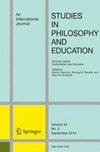Hegel’s Phenomenology of Spirit as Bildungsroman
IF 0.9
4区 教育学
Q3 EDUCATION & EDUCATIONAL RESEARCH
引用次数: 0
Abstract
Abstract This article argues that Hegel’s book The Phenomenology of Spirit can be read as a Bildungsroman or a theory of reception. Hegel (as he appears in this book) sets forth to educate his readers to a historical understanding. This is the article’s main argument which will be split up in three parts. First, it seems that Hegel tries to lead the uneducated reader to his own ideal philosophy. If so, the reception will be merely technical, i.e., the book has only one answer and the reader has to submit to Hegel to get him right. The article argues against such a reading. Secondly, it seems more likely that Hegel invites his readers to take an active part in the interpretation of the book. To substantiate this claim, the article argues that the hitherto unknown phenomenon in the book “touches” and challenges the reader, who must “touch” back and accept the challenge in order to grasp the phenomenon. This reception involves the experience of “touch” (not physical) and is therefore haptic. Thirdly, and in extension of the haptic reception, the article argues that there is a reception as recollection, meaning that Hegel invites the reader to reflect upon the recollected experiences or “the gallery of images” that Hegel has archived in his book. In doing so, the reader will see the gallery of images with new eyes—which ultimately is a process of Bildung as the reader gains self-awareness and knowledge through Hegel’s images.黑格尔作为成长小说的精神现象学
摘要本文认为,黑格尔的《精神现象学》既可以作为一部成长小说,也可以作为一部接受理论。黑格尔(正如他在这本书中出现的那样)着手教育他的读者对历史的理解。这是本文的主要论点,将分为三个部分。首先,黑格尔似乎试图把没有受过教育的读者引向他自己的理想哲学。如果是这样的话,读者的接受将仅仅是技术性的,也就是说,这本书只有一个答案,读者必须服从黑格尔才能得到正确的答案。这篇文章反对这种解读。其次,黑格尔似乎更有可能邀请他的读者积极参与对这本书的解读。为了证实这一说法,文章认为,书中迄今为止未知的现象“触动”和挑战读者,读者必须“触动”并接受挑战,才能掌握这一现象。这种接收涉及到“触摸”的体验(不是物理的),因此是触觉的。第三,作为触觉接受的延伸,文章认为有一种作为回忆的接受,这意味着黑格尔邀请读者反思回忆的经验或黑格尔在书中存档的“图像画廊”。在此过程中,读者将以全新的眼光看待图像库——这最终是一个读者通过黑格尔的图像获得自我意识和知识的过程。
本文章由计算机程序翻译,如有差异,请以英文原文为准。
求助全文
约1分钟内获得全文
求助全文
来源期刊

Studies in Philosophy and Education
Multiple-
CiteScore
2.50
自引率
10.00%
发文量
38
期刊介绍:
Studies in Philosophy and Education is an international peer-reviewed journal that focuses on the philosophical, theoretical, normative and conceptual problems and issues in educational research, policy and practice. As such, Studies in Philosophy and Education is not the expression of any one philosophical or theoretical school or cultural tradition. Rather, the journal promotes exchange and collaboration among philosophers, philosophers of education, educational and social science researchers, and educational policy makers throughout the world. Contributions that address this wide audience, while clearly presenting a philosophical argument and reflecting standards of academic excellence, are encouraged.
Topics may range widely from important methodological issues in educational research as shaped by the philosophy of science to substantive educational policy problems as shaped by moral and social and political philosophy and educational theory. In addition, single issues of the journal are occasionally devoted to the critical discussion of a special topic of educational and philosophical importance. There is also a frequent Reviews and Rejoinders’ section, featuring book review essays with replies from the authors.
 求助内容:
求助内容: 应助结果提醒方式:
应助结果提醒方式:


